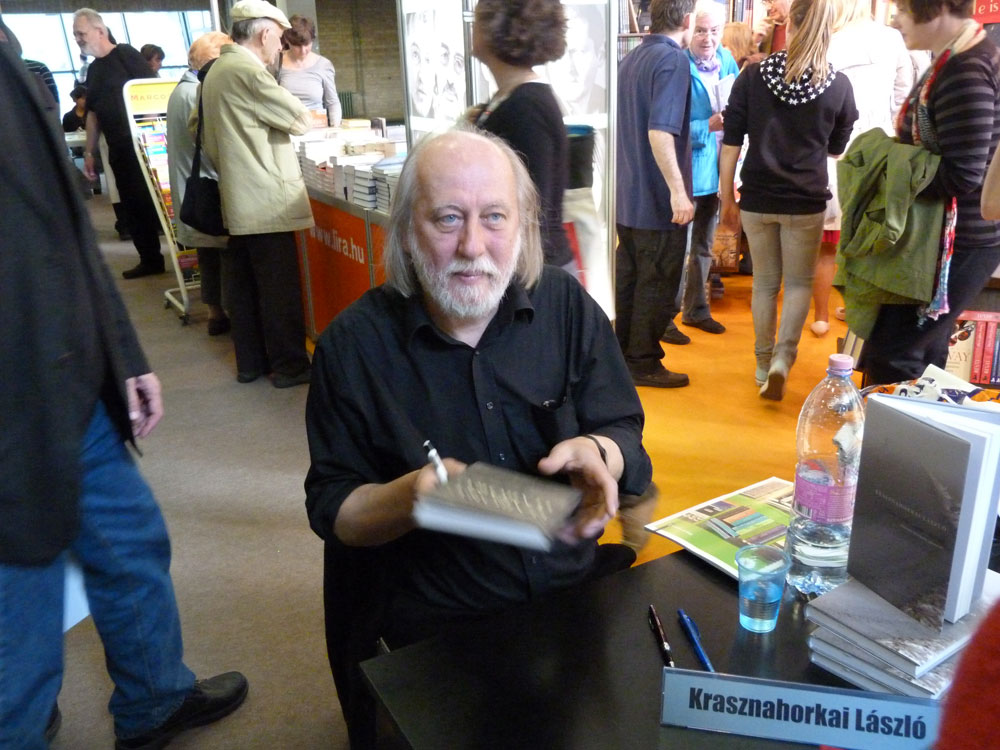
By Bran Nicol
Bran Nicol, University of Surrey
Awarding the Nobel prize for literature to László Krasznahorkai today, the Swedish Academy commended the author’s “compelling and visionary oeuvre that, in the midst of apocalyptic terror, reaffirms the power of art”. But in itself their decision is also a commitment to the value of serious and intellectual writing in an age characterised by immediacy, the distractions of digital culture and the entertainment industry.
Krasznahorkai was first propelled into literary fame in Hungary, his home country, with his first novel Satantango (1985), a novel about a squalid, rain-soaked village visited by a mysterious man. He could be a prophet, Satan or merely a con man.
This book established the coordinates for the subsequent series of ambitious novels that cemented Krasznahorkai’s status as one of the great contemporary global writers.
The Melancholy of Resistance (2019) features a mysterious, charismatic figure, the Prince, who brings a rebellious carnival to a small community and tears it apart. Baron Wenckheim’s Homecoming (2016) tells of an eccentric aristocrat returning to Hungary after exile in Argentina.
He is greeted by the townspeople as a great benefactor who will enrich the town. Little do they know he has returned saddled with a crippling gambling debt.
The 2014 work Herscht 07769 centres on a baker in a neglected eastern German town who is drawn into the world of a cleaning company, which is a front for a neo-Nazi gang.
Krasznahorkai’s work began to be read more widely in the 2000s, following English translations of The Melancholy of Resistance and War and War (1999). More global fame came when he was awarded the International Booker Prize in 2015 and the National Book Award for Translated Literature in 2019 (for Baron Wenckheim’s Homecoming).
The epithets which tend to be applied to his fiction include “hopeless”, “obsessive”, “unsettling” and “intense”. He was famously labelled, in a blurb for his book The Melancholy of Resistance, by the cultural critic Susan Sontag as the “contemporary Hungarian master of the apocalypse”.
More precisely, though, I would say that there are three distinctive features about Krasznahorkai’s writing. There’s his ability to depict social disintegration, often hastened by the influence on a community of mysterious individuals or companies.
Then there’s how he sustains a mood of dread in his fiction – a mood which lends itself to a fear of living under authoritarianism without ever being directly allegorical. This is captured powerfully in the section of his 2013 book The World Goes On entitled “How Lovely”.
This story imagines a lecture series where speakers from all over the world take their turn giving talks, only for one to give three lectures: the first by choice, the second reluctantly, after an invitation to return, and the third because he has been imprisoned in the lecture theatre.
The third distinctive feature is the innovation and complexity of his writing. Herscht 07769 contains only a single full stop in 400 pages. The World Goes On arranges its 17 stories in a Fibonacci sequence – the mathematical sequence in which each element is the sum of the two elements that precede it.
Satantango (made into a seven-hour film by his collaborator Béla Tarr) has a chapter that focuses on two characters who are not identified for nine pages. The experience of reading Krasznahorkai can feel as disorienting and alienating as the situations his characters face.
But this uncompromising literary quality, and the way it still captures the tenor of our times, is what I love about Krasznahorkai’s work. The Nobel committee’s bio-bibliography of the author references, as many critics have done, the fact that he belongs to the great “central European tradition that extends through Kafka to Thomas Bernhard”.
Krasznahorkai’s is fundamentally a modernist kind of writing, one which confronts us with a world without meaning, yet still affirms its faith in beauty and art. The very writing itself is proof of this faith, because it shows that it is possible to think deeply about what matters and to articulate this.
Appropriately enough for a writer famous for his sentences, the Nobel committee’s reference to Krasznahorkai’s capacity to reaffirm the power of art “in the midst of apocalyptic terror” is an intriguingly artful piece of phrasing.
Krasznahorkai’s fiction does not depict the kind of apocalypse this term commonly brings to mind these days, such as nuclear war or climate disaster. It specialises in the apprehension of future breakdown. This suggests that the “apocalyptic terror” is not within his fiction but is the broader context for it – and contemporary literature itself. Krasznahorkai demonstrates that art can counter this.![]()
Bran Nicol is Professor of English at the University of Surrey.





























Leave a Reply